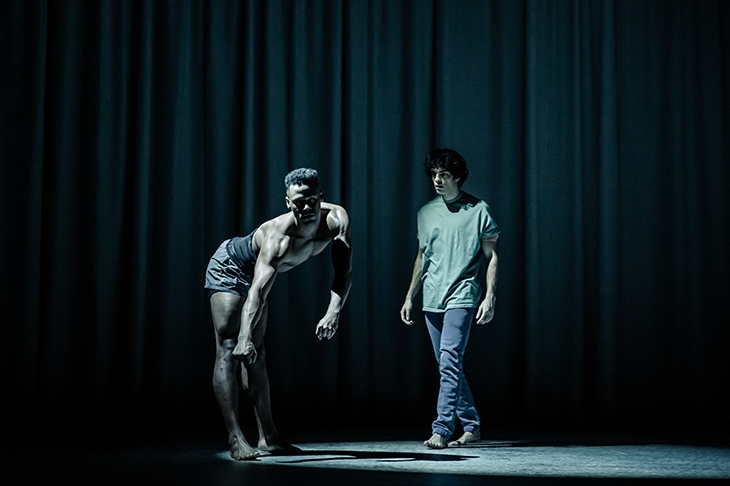Equus is a psychological thriller from 1973 which opens with a revolting discovery. An unbalanced stable-lad, Alan, spends his evenings taking the horses out for an illicit gallop. Meanwhile, he’s busy seducing a hot young cowgirl at the farm but his awakening sexuality confuses him. The girl’s erotic nature brings out his closeted gay side and he tries to purge his homosexuality by stabbing six stallions in the eyes. A mopy shrink (Zubin Varla) takes on Alan’s case but finds himself investigating his own troubled psyche instead. Some of the details in Peter Shaffer’s play have dated badly. Alan’s parents are caricatures of nauseating suburban inanity. The mum is a simpering Bible-hugging Christian while the father is a shouty disciplinarian who denies the existence of God. This pairing looks like a butter-fingered attempt to suggest ‘a house divided against itself’.
In the early 1970s, gay love was still a sufficiently tricky topic to need encryption, and the play approaches it sideways on, with hints and clues. But Ned Bennett’s updated version tosses the code-book away and comes waltzing out of the closet. It’s full-on Pride out there. At press night there was an audible flutter of anticipation as Alan (Ethan Kai) shed his robe and started capering around with his togs off, stabbing nags. The visuals and the sound effects are terrific. The horrible acts of violence at the play’s climax are done simply and artfully but without any kitsch or ketchup. Not even a child would find this eye-gouging scary.
The horse itself, embodied by the amazing Ira Mandela Siobhan, is the show’s outstanding feature. He trots on stage and lowers himself into a half-stoop, legs astride, straight arms pointed downwards, his fists bunched, his neck veins bulging, his nostrils flaring. Every ripple in his torso vibrates with pent-up energy and power. But he evokes more than the creature’s heft and muscularity, he suggests its goodness, its dignity and nobility. Lying somewhere between ballet and performance art, this is the most exquisitely detailed and convincing impersonation of an animal I can recall seeing. As good as War Horse? Pretty close.
The Night of the Iguana is one of the last great plays written by Tennessee Williams. The setting is the Costa Verde, a rotting Mexican hotel run by a sexy American widow called Maxine. The place is thronging with beer-swilling German tourists and bovine Mexican staff who crouch in the shade hoping to nab a tip from a rich gringo. An old pal of Maxine shows up, Revd T. Lawrence Shannon, a former pastor who works as a holiday rep. He seeks accommodation for a busload of whining tourists. More importantly he needs saving from himself.
Shannon is an amazing construction of light and shade. A fallen pastor suspended from his church for calling God ‘a senile delinquent’, he has systematically destroyed every part of his life. He’s battling the booze, he’s racked with fever and nerves, he’s haunted by a spell in a lunatic asylum, and he’s about to be fired by the holiday firm for trysting with a schoolgirl on the tour bus. He can’t re-enter the US without facing arrest for a previous fling with an underage girl. Yet somehow we’re drawn to this drunken, predatory, skirt-chasing low life. Against our will we want him to achieve the salvation he doesn’t deserve. His future seems to lie with Maxine but he’s drawn to Hannah, a skint middle-aged painter who cadges a room at the hotel. Hannah pays for her travels by sketching tourists and peddling jade statuettes which she claims are highly valuable. Her frail, bird-like delicacy conceals a hustler’s cold-eyed calculation. She travels everywhere with her grandfather, a minor poet aged 97, who she uses as a passport to free lodgings and sympathy. The old poet is busy composing his final ode which he duly completes in Act 5. I won’t say what he does after that but it’s not the biggest surprise in dramatic history.
The story is set up so that Shannon must choose between the two women who offer him different varieties of renewal. Three hours pass before he decides, but any play-goer who prizes artistic excellence will relish every minute. The beautifully drawn characters of Hannah and Shannon (played by Lia Williams and Clive Owen respectively) occupy the zenith of the acting profession. Why else do you tread the boards if not for this richness, this abundance of coloration, shade and subtlety? And yet I confess that although I admired every aspect of his handsome and brilliantly executed production, I couldn’t get excited about it. It lacks the emotional climaxes, the peaks of anger and pathos that mark out the best of Tennessee Williams. When Shannon makes his choice, all the play’s tension whooshes out of the theatre. Strictly for connoisseurs.







Comments